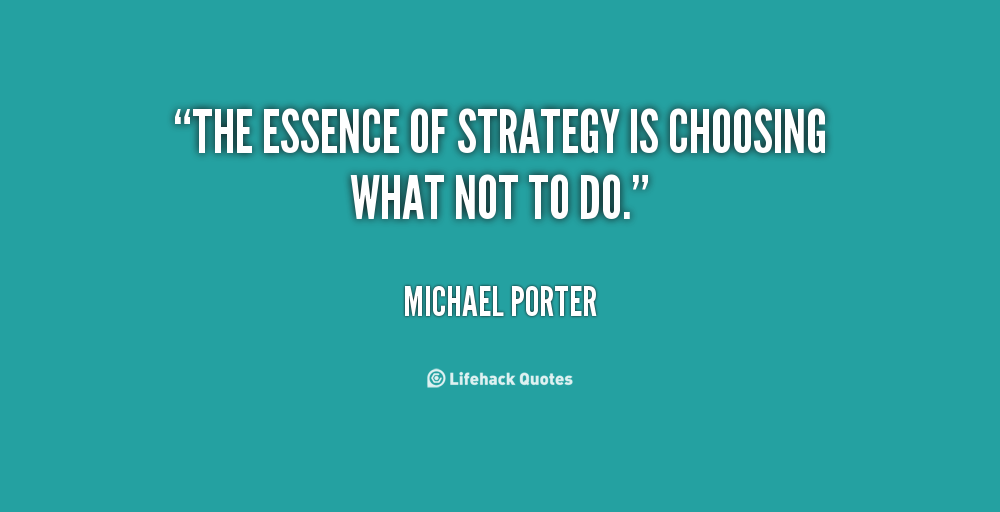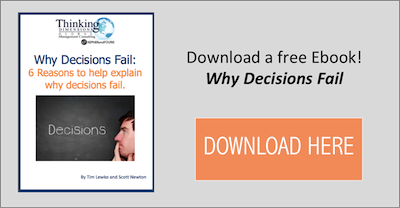I often hear this relatively famous quote from Michael Porter pop up in client worksessions: "The essence of strategy is choosing what not to do." It seems to strike an intuitive chord with executives who “get strategy” or at least are taking the time to build their strategic thinking capabilities.

In fact, I find myself drawn to it because those who lead companies or want to lead companies know that the obvious product or market choices they face are quite clear – it's the ones bordering on the “YES / NO grey area,” that are the real game changers in the quest for better business performance.
So back to the quote…
In reflecting upon my experience and privilege of working with some great strategic thinkers I found 5 irreplaceable traits that they all possess, which help to illuminate the endurance of this quote.
Evaluating yourself against these 5 traits may also highlight your success or possibly areas you can bolster.
TRAIT 1. They all Define what strategy is...
...for themselves and their companies. While we can debate the definition of strategy forever…it remains that the fate of the firm is determined by the sum total of the decisions made on its behalf. And if those decisions do not derive from a common company wide understanding of what strategy is ---there can be very little consistency, quality or alignment relative to the decisions made by anyone in the company. And all decisions start from strategy. Define what strategy is for your organization, business unit or area you are the “president of’.
TRAIT 2: They have a Framework for Strategy.
The foundational choices for any “strategy discussion” center around PRODUCTS, MARKETs and CAPABILITIES(PMC). Great strategic thinkers naturally recognize that strategy is about making the tough IS / IS NOT choices in these three areas. This simple PMC framework motivates simplicity for sorting through the complexity, politics, speed, and rate of change that occurs at the CEO level – so – you need a framework to be a great strategist - one that pulls you from the weeds and allows you to gain quiet clarity.
TRAIT 3: They Have a Process for Decision Making.
This means they follow a set of steps when they work through decisions. Another way to put this is they have a repeated set of questions that they run through when they make decisions.
[For clarity - this does not mean they are regimented, robotic or don’t use judgment and experience. Or they write everything down on paper, iPads or flipcharts. It means because they have repeatable steps for decision-making, (i.e. – state the purpose, understand key criteria, create and evaluate alternatives and assess risk) they're less prone to flawed actions because a process quickly allows them to see what information is needed, missing, crucial or irrelevant.]
Great strategists utilize their decision making process because it stops them from debating or selling alternatives, running after red herrings and probably most importantly letting ego get in the way of what’s best for the company. They are in a more capable position to make the “what we won’t do choices” that Porter refers to.
TRAIT 4: They use Traits 1,2 and 3 to Lead.
The purpose of traits 1-3 (i.e. DEFINTION, FRAMEWORK and DECISION PROCESS) is to create a common language that makes their thinking visible. If something is visible, you can then more effectively engage others for counter points, find holes in data, test assumptions and gain buy-in from key people. This makes their communication real and more effective. Great strategic thinkers know communication is key to making tough choices work. How visible do you make your strategic thinking?
Trait 5: They Focus on Outcomes not Activities.
Great CEOs and executives know that they get paid to make the decisions that result in better performance of the business. While the saying “measure twice cut once” is valid from a strategist point of view, they get paid for the cut not the measuring. It's the same for being a good strategic thinker in your organization – its not about broadcasting the process being used - it’s about naturally using it because it will produce better outcomes. Great CEOs lead with results and naturally build in tools and thinking so they don’t alienate their company.
The power and endurance of Porter’s quote becomes clear when you overlay these 5 irreplaceable traits of great strategic thinkers because it expresses all of them in one sentence.
If you would like more information on how we work with companies to build these traits into their organizations feel free to contact me.






